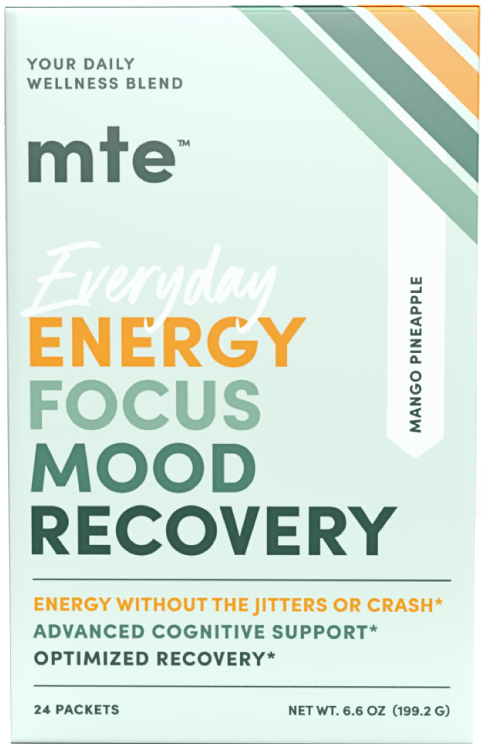
Ashwagandha & Angst: Can This Adaptogen Support Against Stress?
Little bit stressy, little bit depressy. We’re all so stressed 80-150% of the time that it’s literally just memes now. Just in the last couple decades, we saw an exponential increase in anti-stress prescriptions, mood boosters and other treatments meant to help us deal better with the daily grind. But these things don’t come without their costs, and the benefits sometimes don’t outweigh the risks.
Today, we’re on a new front of stress-fighting methods, often referred to as nutraceuticals. Lion’s mane supplements, magnesium mocktails and cannabis candies have started to change how we think about managing stress with substances. Some healthier alternatives include adaptogens – bioactive plants thought to help the body adapt to stress physically and mentally. One such adaptogen with stress-busting potential is ashwagandha.
We love a good ashwagandha moment – is there anything this famous adaptogen can’t do? Touted as useful for everything from vitality and strength to low libido and fertility, can this powerhouse plant promote better stress resilience? Maybe help us stop overthinking and relax for once?
It sure seems that way!
Ashwagandha as an Adaptogen: A Recap
This little shrub has played a part in medicine for at least 6000 years. In Indian Ayurveda, it’s so integral to medicine it serves as its own Rasayana. First recorded in Ancient Sumer, ashwagandha is found in ancient pharmacopoeias across the Old World, including Ancient Greece and the Middle East. In historic contexts, ashwagandha was used for stress, strength, respiratory illnesses, sexual performance, rheumatism, and more.
Modern day, ashwagandha is used all over the world for a host of different ailments. In Somalia, children are given ashwagandha tonics for nightmares. In India, it’s used for skin and joint conditions. In South Africa, it’s used in mainstream clinics for fertility. And in the US, wellness companies create ashwagandha products promising to boost energy, mood, immunity, and more.
For a look at everything ashwagandha, read: Understanding Ashwagandha: From Ancient Ayurvedic Medicine to Modern Health & Wellness
Catastrophes of Chronic Stress: Another Recap
We’re so stressed that scientists have literally changed the concept of what a human stress response entails. Why? Because where our biological responses to stress used to be beneficial – used only in times of actual high stress, life-threatening stuff, they’re more harm now than good. Most of us are chronically in a low to moderate state of stress on a biological level.
Science is more than sure that this is hurting our health. Chronic stress is linked to countless health problems, including:
- Weakened immune system
- Increased risk of heart problems
- Neuronal death in brain structures associated with critical thinking and emotional regulation
- Synaptic impairment (read: literal brain damage)
- Digestive problems, including stomach ulcers
- Chronic fatigue
- Chronic low mood
For more scary stress stuff, read: Understanding the Dangers & Mechanisms of Chronic Stress
And for how stress affects fitness: How Chronic High Stress is Messing with Your Fitness Goals
Clinical Evidence Ashwagandha May Help People Manage Stress
So, is there a natural way to calm down? And is it something that actually helps, not just makes us tired and foggy? It turns out, ashwagandha’s potential as a way to promote better stress resilience isn’t just backed by several millennia of traditional medicine – it’s also indicated by modern medical research.
Recent highlights in research on ashwagandha’s potential to reduce the effects of stress include:
A 2021 review of the human trials on ashwagandha found that within the current body of research, “the strongest evidence for therapeutic efficacy of ashwagandha is the alleviation of stress”.
A 2022 study on adult cognition and mood looked at two different doses of ashwagandha over 30 days of supplementation. Both ashwagandha groups reported decreased self-perceived stress and also had lower levels of stress hormone in their system than the control group.
A 2023 study looked at ashwagandha’s biological role in stress over 60 days of supplementation. After 60 days, the ashwagandha group showed lower morning levels of stress hormone coupled with increases in a neurochemical associated with feeling happy and calm.
A 2021 study on agitation used 60 days of high-concentration ashwagandha as an intervention for stress. At the end of the 60 day, participants had a significant reduction in all stress-assessment scales, relative to placebo. They also had lower levels of pro-stress chemicals in their system, relative to placebo. In addition, despite the high concentration, any adverse effects were mild and equal to the placebo group, and no serious reactions were reported.
Other Stress-Busting Indications for Ashwagandha
But your body isn’t just a series of separate systems and processes – everything is interlinked, interactive, intertwined. So just as an adaptogen might directly support stress resilience, it might also indirectly promote a better stress response by supporting things directly in its orbit. Ashwagandha looks like the real, whole deal on this front, too:
Energy
Stress makes you feel fatigued – like you’re dragging your own dead body through the day. A 2015 study observed a marked increase, relative to placebo, in VO2 max and self-perceived energy and quality of life with 12 weeks of ashwagandha supplements.
Focus
When you’re stressed out and tired, it’s hard to concentrate, problem solve, remember things, and make critical decisions. A 2021 study saw ashwagandha supplements significantly boost scores on recall memory – both increased capacity and reduced errors.
Mood
Stress takes a toll on your mood – even the nicest person asks themselves an AITA or two when they’re stressed and snappy. Another 2021 study observed a significant improvement in scores on a happiness scale used in psychiatric settings in the ashwagandha group, where the placebo group’s scores decreased.
Immunity
Chronic stress is known to make people more susceptible to illness, easier to injure and more difficult to recover. Yet another 2021 study looked at ashwagandha’s effects on several biomarkers for immune function after 30, 60 and 90 days. They saw, relative to placebo, a significant increase in over a dozen types of immunocompetent cells and their progenitors, an effect that increased over time.
Gut Health
Stress is directly linked to a host of digestive issues – remember the last time you were dreading something so hard you got nauseous? That’s real. A 2023 study on an ashwagandha-okra supplement resulted in improvements in bowel clearance and gastrointestinal function.
Recovery
A common complaint of chronic stress is poor sleep. Which just makes literally everything worse. A systematic review from 2022 found that the literature includes numerous studies where ashwagandha supplements:
- Significantly reduced the time it takes to fall asleep within 10 weeks of use
- A significant improvement in sleep efficiency within 10 weeks of use
- Improvements in sleep quality, duration
- Improvements in morning mood
MTE: An Adaptogen-Stacked Ashwagandha Powder for Stress Support
It’s not exactly easy to have ashwagandha on hand all the time – you’re not going to find it in most stores. And then there’s the how-do-you-prepare-it part. Why not find something simple to add to your day that features ashwagandha, other key adaptogens, nootropics, and superfoods?
MTE’s healthy alternative to downers and sketchy chemicals can support stress resilience, mood and immunity. All these things work together to promote your body’s ability to fight environmental and oxidative stress, helping you resist its negative effects from the inside out. One of the key players in that whole-body health support is ashwagandha, but we’ve stacked this natural stress-relief drink with 12 other highly bioactive plant compounds as well. If you’re ready to approach your battle with chronic stress from a new, holistic perspective, this is your new go-to daily feel-good drink.



